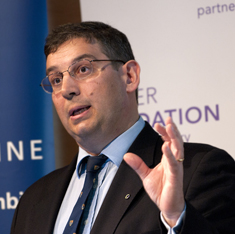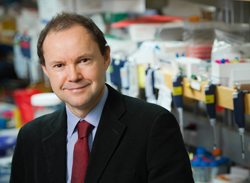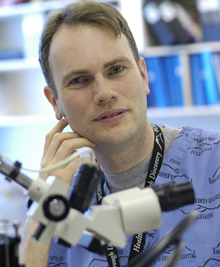Three Professors in the Department of Pathology and Laboratory Medicine — Sam Aparicio, David Huntsman and Torsten Nielsen — have received Canadian Cancer Society Impact Grants, which are largest single grants ever offered by the organization.
Dr. Aparicio will receive $1.25 million over five years to answer questions about how breast cancer arises, grows and mutates. The researchers will use sophisticated techniques to analyze DNA from individual breast cancer cells and then observe how the cells change in response to different conditions, such as chemotherapy drugs. The research has the promise for global impact in terms of understanding the disease as well as improving diagnosis, treatment and patient outcomes.
“Cancer is a moving target. By predicting its actions and directions, we gain a huge advantage in better understanding the disease and how to stop it,” says Dr Aparicio, a senior scientist at the BC Cancer Agency.
To date, scientists have had only a poor understanding of how genetic changes in breast cancer tumours develop and evolve. When this evolution takes place, cancer cells behave differently and can become resistant to treatment and invade and spread to other parts of the body.
But recent technological advances – such as next-generation DNA sequencing devices, coupled with cutting-edge computer algorithms and statistical models – have made it possible for the Vancouver team to analyze billions of pieces of genetic data from tumour samples to predict which of the thousands of mutations are causing cancer and which ones are harmless.
“It can be compared to the way Google works when you enter a search term and it returns results,” says Sohrab Shah, Assistant Professor in the Department of Pathology and Laboratory Medicine who works with Dr Aparicio at the BC Cancer Agency. “Because of this rapid genome sequencing technology, we can now collect an immense quantity of information about the DNA of cancer cells, and make sense of it using computational approaches.”
“This is one of the most transformative moments in cancer research in decades,” says Dr Shah.
In this study, Dr Aparicio’s team is focusing specifically on an aggressive type of breast cancer known as triple-negative. There are currently no targeted treatments for this type of breast cancer.
“This can be a devastating disease because it is more likely to spread and reoccur,” says Dr Aparicio. “This research will lead us forward so that we can learn how to beat these evolving tumours with combinations of drugs.”
Dr. Huntsman’s 1.25 million Impact Grant will enable him to use advanced genomic approaches, including whole genome sequencing, to identify driver mutations ‑‑ mutations that cause normal cells to become cancerous ‑ in two of the most deadliest forms of ovarian cancer. Dr Huntsman’s team will pinpoint the genetic mutations that underlie these cancers to identify new biomarkers and treatments as well as strategies to prevent these cancers from occurring in women with pre‑cancerous endometriosis.
Dr. Nielsen, who will also receive $1.25 million, has made major progress in the understanding of a rare soft tissue cancer ‑‑ synovial sarcoma – which mainly affects children and young adults and for which standard anticancer therapies offer little benefit. Dr Nielsen is building this work to explore the fundamental biology of similar sarcomas by constructing mice models to study the diseases and identify effective drugs to move new therapies to clinical trials and improve outcomes for patients.


